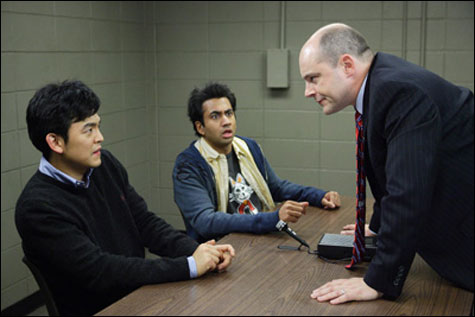Where Harold And Kumar Went
Reviews often tell you more about the critic than the film. For instance, Scott Mendelson on the latest Harold And Kumar. He doesn't like it, but what I found interesting was his take on the first two of the series.
Harold and Kumar Go to White Castle is arguably the best comedy of the prior decade. It's laugh-out-loud funny, but also filled with intelligent characters engaging in outlandish, but almost-plausible adventures in search of a most simple pleasure (a hamburger). It was crude, but not stupid about its raunch, and it created a wonderful 'this is America' tapestry that helped make it one of the finest films about race/ethnicity relations in modern cinema. Harold and Kumar Escape From Guantanamo Bay is every bit as lousy as most of us expected the first film to be.
This is fascinating since my take is the exact opposite. I found the first film a disappointment and thought the second was much better, as well as the one that revealed a "this is America" tapestry. But that could just be a difference in aesthetics. However, Mendelson goes on and it starts to sound like his real complaint is political.
More importantly, [Harold and Kumar Escape From Guantanamo Bay is] outright immoral in how it claims political topicality but sells the three biggest post-9/11 lies around (there are no innocent men in Gitmo, the post 9/11 abuses are the result of a few bad apples, and George W. Bush is really just 'one of us').
This is bizarre. Sure, he's taking the politics of a farce too seriously, but even if you want to try a close reading, he's missing what's right in front of him. Let's look at how the film supports his three biggest "lies."
1. There are no innocent men in Gitmo. Did he actually watch the film? The main plot device is an innocent Harold and Kumar are arrested and thrown in Gitmo. He's just pissed that the few prisoners they meet are actual enemies of the U. S. (you know, like most of the prisoners in Gitmo).
2. Post 9-11 abuses are the result of a few bad apples. I guess he gets this from how the head of Homeland Security finds his deputy is a bad guy and fires him. I think this misses a rather more important point--the Deputy Secretary of Homeland Security is the bad guy! He's an idiot, he's a racist, he's ineffective, he's cruel and he has contempt for due process. Once again, not enough for Mendelson. I guess every member of Homeland Security has to be a cartoon villain or he's not satisfied.
3. George Bush is just one of us. Near the end of the film, H and K meet W, who turns out to be a regular guy. I can see the steam coming out of Mendelson's ears--how dare they suggest our last President was anything but a cold, evil human being. But no matter how you view it, part of the comic portrait is W as a drug-taking arrested adolescent who's scared of Dick Cheney. So having Cheney be the President's evil puppetmaster apparently isn't worth noting, though I think we've finally hit on something that's an actual big post-9/11 lie.
PS Speaking of odd critical reactions, here's the J. Hoberman money quote that's on the poster for Melancholia: "when I left the theater and exited out into Cannes, I felt light, rejuvenated and unconscionably happy."
If you're not familiar with the film, it ain't Singin' In The Rain. Melancholia is two hours about depression and apocalypse. Well, to each his own.


0 Comments:
Post a Comment
<< Home